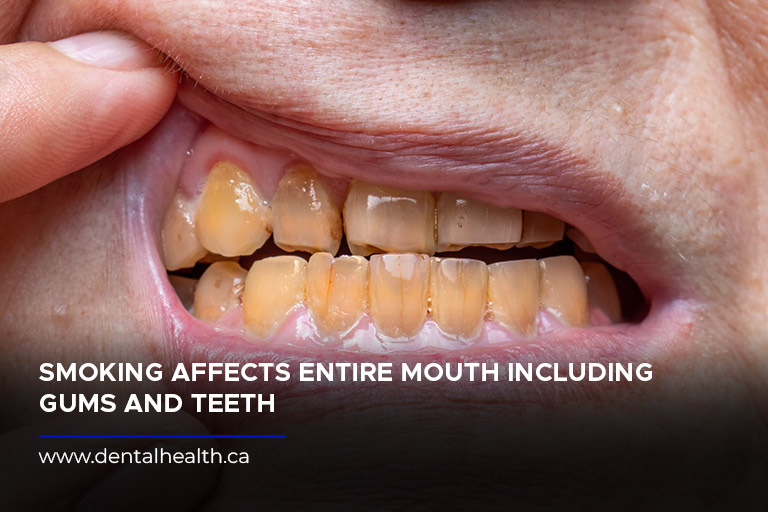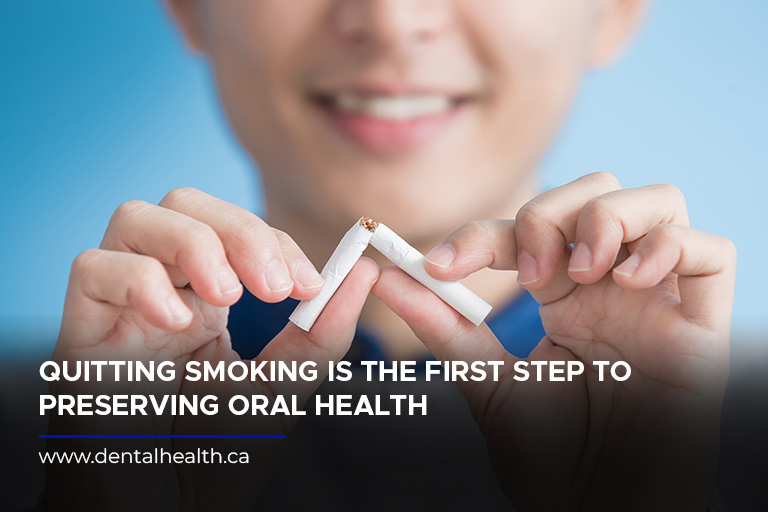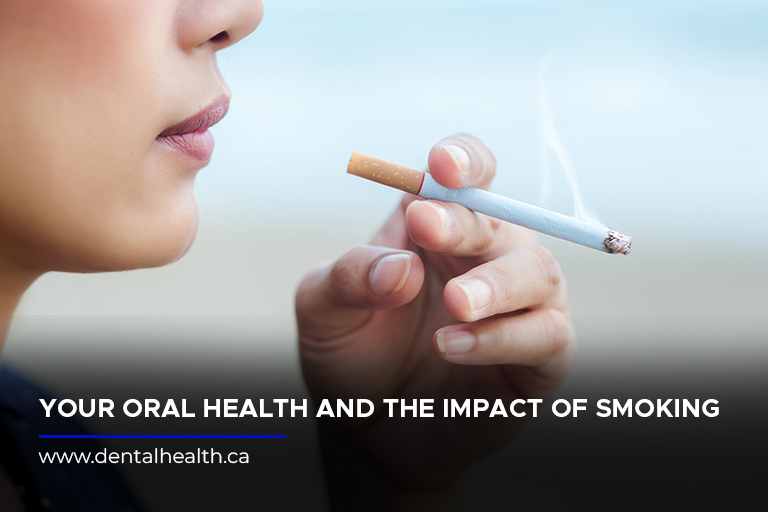Canada faces a concerning statistic, with 12% of Canadians aged 15 and older currently smoking cigarettes. This habit not only jeopardizes overall health but also takes a significant toll on oral well-being. For smokers in Grimsby, understanding the profound link between smoking and oral health is paramount to making informed decisions about their future.
This comprehensive article explores the intricate relationship between smoking and oral health, shedding light on the insights provided by a Grimsby dentist. It equips you with practical strategies to protect your oral health and offers valuable resources for embarking on a smoke-free journey.
How Smoking Damages Your Mouth
Smoking can cause severe and sometimes irreversible damage to your oral health. Here are some key ways it affects your mouth:
- Stained Teeth: The tar and nicotine from cigarettes cling to tooth enamel, leading to stubborn yellowing and discoloration. Removing these stains often requires professional dental intervention, making maintaining a bright smile challenging for smokers.
- Gum Disease: Smoking compromises the immune system’s ability to combat infections, leaving gums vulnerable to periodontal disease. If untreated, this severe condition can erode the gums’ supportive structures, ultimately leading to tooth loss.
- Bad Breath: Halitosis, or persistent bad breath, plagues smokers due to the buildup of tobacco residue in the mouth. This unpleasant side effect can hinder social interactions and lower self-esteem.
- Tooth Decay: Smoking accelerates plaque and tartar accumulation, creating a breeding ground for harmful bacteria. This, in turn, increases the risk of cavities and tooth decay, potentially necessitating extensive dental repairs.
- Oral Cancer: Among the leading causes of oral cancer, smoking poses a significant threat to the lips, tongue, cheeks, and throat. Regular dental checkups become paramount for early detection and treatment, highlighting the importance of vigilance for smokers.
- Slow Healing: Tobacco use impairs the body’s natural healing mechanisms, slowing recovery after dental procedures. This delay increases the risk of complications and infections, adding further challenges to dental care for smokers.
- Loss of Taste and Smell: Smoking gradually dulls the senses, diminishing the ability to savour flavours and aromas. This sensory deprivation can negatively impact meal enjoyment and overall quality of life.
- Weakened Jawbone: Smoking accelerates bone loss, including in the jawbone. This weakens the foundation supporting teeth, making them susceptible to loosening and potential loss.
- Black Hairy Tongue: In severe cases of hairy tongue, the tongue may develop a black or dark brown appearance. This discoloration stems from an excessive growth of pigmented bacteria and yeast, emphasizing the detrimental impact of smoking on oral health.
Lesser-Known Oral Health Risks for Smokers

While the above issues are well-known, there are other, less commonly discussed risks associated with smoking:
- Dry Mouth: Tobacco use diminishes saliva production, leading to chronic dry mouth. Saliva plays a crucial role in rinsing away food particles and neutralizing harmful bacteria. Its absence elevates the risk of tooth decay, gum disease, and oral infections.
- Receding Gums: The harmful chemicals in tobacco products irritate and damage gum tissue, causing it to recede from the teeth. This exposes the sensitive roots, increasing susceptibility to decay, discomfort, and potential tooth loss.
- Leukoplakia: Tobacco use can trigger the development of leukoplakia, characterized by thick, white patches on the gums, tongue, or inner cheeks. While often harmless, these lesions can occasionally signal precancerous changes, necessitating close monitoring.
- Sinusitis: Smoking irritates and inflames the delicate lining of the sinuses. This can lead to chronic sinusitis, a persistent infection marked by facial pain, pressure, and nasal congestion. Untreated sinusitis can also negatively impact dental health.
- Smoker’s Keratosis: The intense heat and chemicals in tobacco smoke can cause smoker’s keratosis. This condition manifests as white or greyish patches on the roof of the mouth. While not always cancerous, it can be a precursor to oral cancer and requires careful observation.
- Implant Failure: Individuals who smoke face a heightened risk of dental implant failure. Tobacco use compromises blood flow and hinders the healing process, making it difficult for implants to integrate successfully with the jawbone.
- Oral Thrush: Smoking disrupts the natural balance of microorganisms in the mouth. This imbalance can lead to an overgrowth of Candida, a fungus responsible for oral thrush. Oral thrush causes discomfort, white patches, and can be challenging to treat in smokers.
Steps Towards a Healthier Mouth in Grimsby

While the above issues are well-known, there are other, less commonly discussed risks associated with smoking:
- Quit Smoking: Kicking the habit of smoking is the most significant action you can take to enhance both your oral and overall well-being. Seek guidance from your doctor or healthcare provider to discover smoking cessation resources that align with your individual requirements.
- Regular Dental Checkups: Prioritize regular dental checkups every 6 months for comprehensive cleaning, examinations, and early identification of any potential oral health concerns. Your dentist can evaluate your unique risk factors and suggest tailored care based on your specific needs.
- Brush and Floss Daily: Maintain optimal oral hygiene by brushing twice daily with fluoride toothpaste and flossing daily to eliminate plaque and food particles that accumulate between teeth, reducing the risk of cavities and gum disease.
- Use Mouthwash: Integrate an antimicrobial mouthwash into your daily routine to diminish bacteria and refresh your breath, particularly if you suffer from dry mouth, which can increase the likelihood of tooth decay.
- Stay Hydrated: Ensure you stay well-hydrated by drinking ample water throughout the day. This helps combat dry mouth, stimulates saliva production, and washes away food particles that could otherwise contribute to dental issues.
- Chew Sugar-Free Gum: Consider chewing sugar-free gum after meals and snacks to encourage saliva flow, which aids in neutralizing acids produced by bacteria and safeguards your teeth from decay.
- Choose Healthy Foods: Make a conscious effort to select a balanced diet abundant in fruits, vegetables, and whole grains. Simultaneously, limit your intake of sugary and acidic foods and drinks, as these can weaken tooth enamel and contribute to dental problems.
The detrimental effects of smoking on oral health are irrefutable, but quitting and embracing a proactive approach to oral hygiene can pave the way for a healthier mouth and a brighter smile. If you’re a smoker in Grimsby, don’t hesitate to seek support and resources to break free from this habit. Your oral health, and your overall well-being, will reap the rewards.
For personalized guidance and comprehensive oral care, contact Kingsway Family Dentistry at (905) 563-4001.

